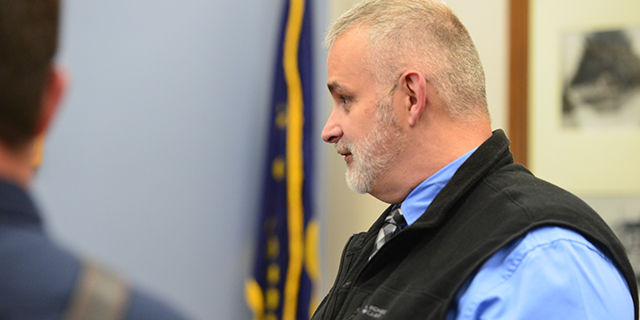A DAUNTING TASK
Published 12:00 am Saturday, August 23, 2003

- INDIAN CONNECTION: Pastor Steve Kirkeby of Valley Fellowship got acquainted with B.V.R. Rao (left) when Kirkeby visited India in January 2002. They are seen standing outside the district jail, where Rao ministers. Rao will share his story at Kirkeby's church Sunday. (Submitted photo).
By Dave Stave
Trending
Observer Staff Writer
While inmates in India’s prisons are looking forward to their release day, an Indian pastor is focusing on getting inside the prisons to help prisoners with their spiritual, educational, physical and family needs.
B.V.R. Rao, president of Prison Fellowship in India, will be in La Grande Sunday to talk about the ministry that he and his small staff and large team of volunteers take to the prisoners of India.
Trending
The job of helping India’s inmates might seem overwhelming, Rao said.
India, second in population to China, has 1.1 billion people and 3,000 correctional facilities. Prison Fellowship has regular programs in more than 1,500 of the prisons and occasional activities in the others.
Rao, 52, who joined Prison Fellowship in 1987, has a prison that he visits not far from his home in Vijayawada, a city on south-central India’s east coast with a population of 1.5 million.
Steve Kirkeby, co-pastor of Valley Fellowship in La Grande, visited Rao and the prison in January 2002.
Kirkeby invited Rao to speak at the 10 a.m. service Sunday at the church, 507 Palmer Ave.
Rao also will share about his work in India at an informal gathering at 7 p.m. at the home of John and Yvonne Bowling, 1100 Alder St. The public is invited to the service and gathering.
Rao attended a Prison Fellowship international conference in Canada earlier this summer, and was staying this week with his brother-in-law, Sam Bagchi, in Regina, Saskatchewan, before traveling by bus to Boise.
In his work, Rao travels throughout India’s 33 provinces visiting prisons, meeting with his paid staff and training the organization’s 3,000 volunteers.
But when he’s home, his hands are also full. Rao and his wife, Sabita, are providing housing for 25 struggling children. Dormitories were set up at the couple’s home for the 16 boys and nine girls.
While Prison Fellowship volunteers share the teachings of Jesus Christ and organize Bible studies and prayer meetings in the prisons, the moral instruction component, as Rao calls it, is only one facet of the services provided inmates.
Drama in prisons
Prison Fellowship of India also has a program in which drama groups and musicians go into the prisons. Inmates are trained to perform dramas, emphasizing constructive topics that build up their lives, their families and communities, Rao said.
The Christian organization also offers literacy instruction and materials for the estimated 45 percent of India’s inmates who are unable to read or write.
"We want to help with the national goal in literacy," Rao said. "But indirectly we are preparing the inmates to be capable of reading scripture portions."
Prison Fellowship’s educational component allows inmates to complete their high school requirements and go on to college or professional studies in areas such as computers, law or medicine.
Rao said Prison Fellowship also has a relief program that helps prisons improve their sanitary systems and assists inmates with their medical, diet, eye-care and other physical needs. Nurses, physicians and paramedics help in these areas.
Prison Fellowship helps inmates connect with their families. Inmates often lose contact with their spouses and children, as family members shun the prisons.
"An inmate is unhappy and asks us to go and make contact with his family," Rao said in a telephone interview from Canada. "He wants us to see his wife, son and daughter.
"There are many success stories of how inmates have been reunited with their family members," Rao said.
The Prison Fellowship executive said his organization also has programs that reach out to help the inmates’ families.
"We look after their needs. We counsel them so they do not go down the path of crime," he said.
Prison Fellowship also offers vocational training to inmates to give them a skill to help them when they are released.
For a $50 to $100 investment, an inmate is trained and given the equipment he needs to manufacture disposable eating plates made of leaves.
Repairing stoves
For the same investment, a paroled prisoner can have the tools to repair LPG burners, commonly used for cooking in India.
The return rate to prison is reduced when programs like these are in place, Rao said.
"When he (the inmate) comes out, we want him to have the employment and food he needs so he will not go back to prison."
In the 1970s, Rao studied theology at Allahabad Seminary and sociology at North Eastern Hill University, both in India.
He then spent two years conducting research on street children.









